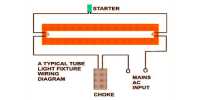When white light falls on a prism, placed in a spectrometer, the waves of different wavelengths are deviated to different directions by the prism. The image obtained in the field of view of the telescope consists of a number of coloured images of the slit. Such an image is called a spectrum.
If the slit is illuminated with light from sodium vapour lamp, two images of the slit are obtained in the yellow region of the spectrum.
These images are the emission lines of sodium having wave lengths 5896Ao and 5890Ao. This is known as spectrum of sodium.
The spectra obtained from different bodies can be classified into two types
(i) emission spectra and (ii) absorption spectra.













